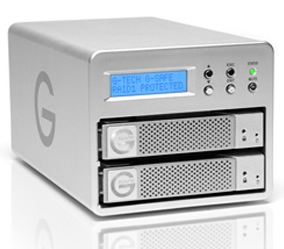
Hitachi Global Storage Technologies (hereafter referred to as HGST) just bought Fabrik, the company that produces and distributes consumer storage devices as SimpleTech and pro/AV storage using the G-Technology name.
We in the enterprise storage sector are all too familiar with the epic battles between Hitachi Data Systems (let’s call them HDS) and EMC, both providers of storage systems to the enterprise IT market. And last year EMC purchased consumer drive maker Iomega, pushing out some impressive storage systems that combine the best of both companies.
So is Hitachi’s combination with SimpleTech a response or challenge to EMC’s acquisition of Iomega? In a word, no.
First there is the small issue that HGST is an entirely different company from HDS. Both are subsidiaries of the massive Hitachi, Ltd. of Japan, but to conflate them into one company would be a disservice:
- HGST is much more like Seagate Technologies or Western Digital – a maker of hard disk drive mechanisms, the core components of modern data storage devices from the consumer to enterprise space.
- HDS is much more like EMC or NetApp – a maker of storage systems and software aimed at the enterprise IT market.
- Parent company Hitachi, Ltd. makes all sorts of stuff, from appliances to monorails (no kidding!) and so is much like Mitsubishi or Fujitsu.
Where EMC is actively expanding Iomega’s marketing into a supplier of tiny storage systems for entry-level IT and lab use, we shouldn’t expect the same synergistic offerings from HDS and SimpleTech or G-Technology. Instead, we should look at this as a response to Seagate’s purchase of Maxtor and Toshiba’s consolidation with Fujitsu’s disk unit: HGST will have a much better consumer channel for its disk drive mechanisms and will be better able to compete with those companies and Western Digital in places like Staples and Best Buy.
This is not to say that SimpleTech and G-Technology doesn’t compete with Iomega, mind you. In fact, Fabrik’s two brands were head-to-head with EMC’s little sister in just about every corner of their markets, and they make some cool devices for the SOHO market. Check out the [re]drive, G-Drive Mini SSD, and G-Speed XL if you don’t believe me!
Sounds like a win for them, but not a game-changer for enterprise storage.
This article can also be found on Gestalt IT: Does Hitachi+SimpleTech = EMC+Iomega?
Actually, to be accurate, HDS is nothing like an EMC or a NetApp. The latter two design, build and manufacture the products that they sell, while HDS sells and markets hardware that is created by Japan-based Hitachi Ltd. In a sense, HDS is more like an wholly-owned marketing subsidiary, or maybe even an OEM customer of Hitachi – you might say HDS’s relationship with Hitachi is more like HP’s.
THus, you are absolutely right – if there are any synergies to be had with these new acquisitions, they won’t be created by HDS. HGST might collaborate with the mother ship Hitachi, although given that HGST is mostly still the old IBM disk drive division, the ties might still not be strong enough to attempt that. HGST is probably no more likely to work with HDS than it is with Hitachi’s home entertainment or construction equipment subsidiaries.
I’m not sure it’s fair to marginalize HDS (or HP, for that matter) as a mere OEM customer or marketing subsidiary. HDS and HP both exercise quite a bit of independence from Hitachi the hardware supplier, and both have quite a bit of development muscle focused on storage. Everyone (including NetApp and EMC) has OEM suppliers for certain elements of their systems, and EMC is certainly involved in more areas of hardware design than most storage makers, but HDS is much more than a marketing organization.
Sorry, it wasn’t meant to marginalize weither HDS nor HP, but I’m not aware of any significant amount of storage development being done by HDS outside of some external management tools. And HP has admitted that their development for the XP24000 is limited to documentation and storage management-related integration with the rest of their product line – my understanding is that the USP-V and its microcode is virtually untouched by HP hands.
And I may be wrong here too, but my understanding is that neither the USP-V nor the AMS are built by HDS either.
Perhaps my insight is a bit dated, but I know that HDS and HP had to do quite a bit of software and firmware development back in the day. I remember back in the day (before Compaq) that an HP insider moaned to me that they did a ton of work to make the XP compatible with all sorts of UNIX systems (Sun, IBM) and were forced to feed that work back through Hitachi to HDS and Sun.
Plus, the storage teams there both work with all sorts of other systems than the marquee arrays.
Anyone from HP or HDS (or Sun) want to chime in here?
Perhaps my insight is a bit dated, but I know that HDS and HP had to do quite a bit of software and firmware development back in the day. I remember back in the day (before Compaq) that an HP insider moaned to me that they did a ton of work to make the XP compatible with all sorts of UNIX systems (Sun, IBM) and were forced to feed that work back through Hitachi to HDS and Sun.
Plus, the storage teams there both work with all sorts of other systems than the marquee arrays.
Anyone from HP or HDS (or Sun) want to chime in here?